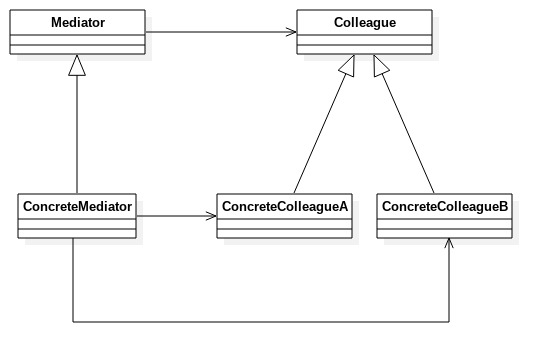中介者模式是關於數據交互的設計模式,該模式的核心是一個中介者對象,負責協調一系列對象之間的不同的數據請求,這一系列對象成為同事類。如房產中介(簡直不想提它),買房的賣房的,租房的放租的都到房產中介那裡去登記。如果有賣房的就會通知買房的去買房,如果有放租的就會通知租房的去租房。所有的事物都是通過中介進 ...
中介者模式是關於數據交互的設計模式,該模式的核心是一個中介者對象,負責協調一系列對象之間的不同的數據請求,這一系列對象成為同事類。如房產中介(簡直不想提它),買房的賣房的,租房的放租的都到房產中介那裡去登記。如果有賣房的就會通知買房的去買房,如果有放租的就會通知租房的去租房。所有的事物都是通過中介進行通知轉換,這樣就形成了一個典型的星型結構,說道星型結構,網路中的交換機路由器不就是個大大的中介者麽。
作用
中介者模式包裝了一系列對象相互作用的方式,使得這些對象不必相互明顯作用。從而使它們可以鬆散耦合。當某些對象之間的作用發生改變時,不會立即影響其他的一些對象之間的作用。保證這些作用可以彼此獨立的變化。
類視圖

實現
中介者模式為拍賣行角色,負責買家、賣家和貨幣轉換的協調工作,其中印度買家和法國買家想拍賣美國賣家的東西,印度使用的是盧比,法國使用的是美元,而美國使用的是美元,所有的出價都要以美元進行結算;這樣就需要拍賣行來協調進行價格換算,拍賣競價等工作。
//頭文件mediator.h
#include <string>
class Mediator;
class Colleage //同事類
{
public:
Colleage(Mediator* md);
protected:
Mediator *m_mediator;
};
class IndianBuyer: public Colleage
{
public:
IndianBuyer(Mediator* md);
void setTotalMoney(float fall);
int Purchase(float bid);
private:
float m_total_money; //買家的心理價位
};
class FrenchBuyer: public Colleage
{
public:
FrenchBuyer(Mediator* md);
void setTotalMoney(float fall);
int Purchase(float bid);
private:
float m_total_money;
};
class AmericanSeller: public Colleage
{
public:
AmericanSeller(Mediator* md);
void SetWantPrice(float price);
bool IsBidAccept(float bidInDollars);
private:
float m_priceInDollars; //賣家的心理價位
};
class DollorConver: public Colleage
{
public:
DollorConver(Mediator* md);
float ConverToDollars(float bid, std::string strName);
private:
float ConverRupeetoDollar(float bid);
float ConverEurotoDollar(float bid);
private:
float dollor_unit; //美元換算比例
float euro_unit; //歐元換算比例
float rupee_unit;//盧比換算比例
};
class Mediator
{
public:
Mediator();
void RegisterIndianBuyer(IndianBuyer* buyer);
void RegisterFrenchBuyer(FrenchBuyer* buyer);
void RegisterAmericanSeller(AmericanSeller* seller);
void RegisterDollorConver(DollorConver* conver);
bool placeBid(float bid,std::string strName);
private:
IndianBuyer* m_pIndian;
FrenchBuyer* m_pFrench;
AmericanSeller* m_pAmerican;
DollorConver* m_pConver;
};mediator.cpp
#include <iostream>
#include "mediator.h"
using namespace std;
Colleage::Colleage(Mediator* md):m_mediator(md)
{
}
IndianBuyer::IndianBuyer(Mediator* md):Colleage(md),m_total_money(-1){
m_mediator->RegisterIndianBuyer(this);
}
void IndianBuyer::setTotalMoney(float fall)
{
m_total_money = fall;
}
int IndianBuyer::Purchase(float bid)
{
//價格合適就出價一次
if (m_total_money<0 || bid<= m_total_money)
{
return (int)m_mediator->placeBid(bid,"RUPEE");
}
else
{
return 2;//價格太高了 不要啦
}
}
FrenchBuyer::FrenchBuyer(Mediator* md):Colleage(md),m_total_money(-1){
m_mediator->RegisterFrenchBuyer(this);
}
void FrenchBuyer::setTotalMoney(float fall)
{
m_total_money = fall;
}
int FrenchBuyer::Purchase(float bid)
{
if (m_total_money<0 || bid<= m_total_money)
{
return (int)m_mediator->placeBid(bid,"EURO");
}
else
{
return 2;
}
}
AmericanSeller::AmericanSeller(Mediator* md):Colleage(md),m_priceInDollars(0){
m_mediator->RegisterAmericanSeller(this);
}
void AmericanSeller::SetWantPrice(float price)
{
m_priceInDollars = price;
}
bool AmericanSeller::IsBidAccept(float bidInDollars)
{
if (bidInDollars>=m_priceInDollars)
{
//當遇到價格增長時記錄最高的價格,沒有人超過這個價格就按照這個價格出售
m_priceInDollars = bidInDollars;
return true;
}
return false;
}
DollorConver::DollorConver(Mediator* md):Colleage(md)
,dollor_unit(1.0),euro_unit(0.7),rupee_unit(45.0){
m_mediator->RegisterDollorConver(this);
}
float DollorConver::ConverToDollars(float bid, std::string strName)
{
if (strName.compare("RUPEE")==0)
{
return ConverRupeetoDollar(bid);
}
else
{
return ConverEurotoDollar(bid);
}
}
float DollorConver::ConverRupeetoDollar(float bid)
{
return bid*(dollor_unit/rupee_unit);
}
float DollorConver::ConverEurotoDollar(float bid)
{
return bid*(dollor_unit/euro_unit);
}
Mediator::Mediator():m_pIndian(NULL),m_pFrench(NULL)
,m_pAmerican(NULL),m_pConver(NULL){
}
void Mediator::RegisterIndianBuyer(IndianBuyer* buyer)
{
m_pIndian = buyer;
}
void Mediator::RegisterFrenchBuyer(FrenchBuyer* buyer)
{
m_pFrench = buyer;
}
void Mediator::RegisterAmericanSeller(AmericanSeller* seller)
{
m_pAmerican = seller;
}
void Mediator::RegisterDollorConver(DollorConver* conver)
{
m_pConver = conver;
}
bool Mediator::placeBid(float bid,std::string strName)
{
float dollars = m_pConver->ConverToDollars(bid,strName);
return m_pAmerican->IsBidAccept(dollars);
}
int main(int argc,char *argv[])
{
Mediator mediatior;
IndianBuyer indian(&mediatior);
FrenchBuyer french(&mediatior);
AmericanSeller american(&mediatior);
DollorConver conver(&mediatior);
indian.setTotalMoney(6000);
french.setTotalMoney(100);
american.SetWantPrice(50);
int nIndian = 0;
int nFrench = 0;
float IndianBid = 2000;
float FrenchBid = 30;
//一輪一輪進行出價,當有一個出不起的時候,就結束競價。
while(nIndian+nFrench<=2)
{
do{
nIndian = indian.Purchase(IndianBid);
IndianBid+=100;
if (nIndian == 1)
{
cout<<"indian purchase : "<< IndianBid <<endl;
}
}
while(nIndian==0);
do{
nFrench = french.Purchase(FrenchBid);
FrenchBid+=1.5;
if (nFrench == 1)
{
cout<<"french purchase : "<< FrenchBid <<endl;
}
}
while(nFrench==0);
}
return 0;
}當我們開始任何產品研發的時候總會有一些類,這些類會使用到之前產品的研發成果,隨著功能的增加,邏輯會變得更加複雜,我們會添加更多的類和之前的類互相作用,知道難以維護所有的代碼。中介者模式關心的就是這個問題,它會使代碼更容易維護。它能夠實現類之間的鬆散耦合。只有中介者這一個類知道所有的類,其他類只需要與中介者進行交互即可,當然更加集中的控制也會帶來中樞的龐大,還是需要避免過度的集成。
應用場景
- 一組對象使用了標準的通信方式,但整體通信的連接都非常複雜,由此產生的相互依賴的結構導致系統難以結構化,也很難理解;
- 由於對象之間的通信和相互引用,導致對象難以重用。
- 分佈於對個類中間的行為能夠統一定製化,而無需創建過多的子類。



